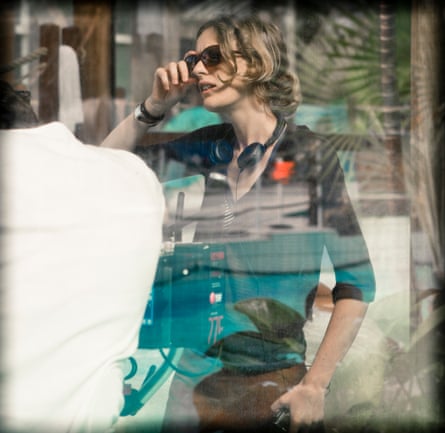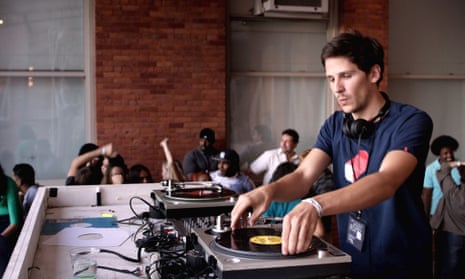The central scene in Mia Hansen-Løve’s Eden doesn’t last very long. It takes place during a heady party in the home of Thomas Bangalter’s parents. We are in the sitting room of the packed apartment, watching Bangalter and his partner Guy-Manuel de Homem-Christo preparing to play music as Daft Punk for the first time. We hear the pair whisper to each other, watch them drum their fingers nervously, adjust the levels on the mixer again and again. Then, finally, the needle is placed on a platter of vinyl. The opening bars of Da Funk blast out, a song that would go on to be played countless times across the world. This small party goes wild but, as the track plays, the camera pulls away.
“I love the idea of this distance,” says Hansen-Løve, describing how she composed the scene. We are talking early one Sunday morning in a small office at the top of her home in Paris’s Marais district. Behind her desk sits an enormous box filled with drafts of the script for Eden, an intensive, troubled project that took three years and two producers to complete. “In the profile shot, Bangalter and Homem-Christo still belong to the group,” she says. “Then, from the far shot, we see them face on but suddenly they are somewhere else. We have lost them. They are here, but you don’t hear what they say any more because they are stars. I love how we captured that moment.”
Bangalter and Homem-Christo are not the heroes of Eden. The characters pop up two or three times, usually in the queue to a nightclub, too cool to say “Do you know who we are?” to unyielding doormen. Neither is Eden is a chronicle of the wildly influential “French touch” scene that produced Daft Punk, Justice, Cassius and Etienne de Crécy, though it is full of that music. It is, however, a beautiful, elegaic film that captures wonderfully the camaraderie and euphoria of club culture – but also its ephemeral nature and habit of leaving people with a nasty hangover.
The story follows the life of Paul Vallée (played by Félix de Givry), a DJ, hedonist and lost soul. Like his friends in Daft Punk he shares in the rise of French touch, but unlike the Get Lucky duo, his success is fleeting. Paul is based closely on Sven Hansen-Løve, Mia’s brother and former DJ, who co-wrote the film with her. “It was so exciting for the both of us,” says Hansen-Løve of the project, “just being aware that there was no film that really took [club culture] seriously. There were films that used house music here and there, scenes set in clubs, but not a film about a DJ. Ours would be a film that would show the euphoria of it but also the reality.”
So we watch as Paul goes from playing raves in abandoned buildings in the banlieues to MoMA in New York. We watch him stay up all night with his pals and his lovers, joking, drinking and, as this is France, debating the political subtext of Paul Verhoeven’s Showgirls. But we also watch him become dependent on cocaine, lose both friends and lovers, and most poignantly of all, we watch time overtake him before he has even stopped to think what he wants from life.
“The first part of the film is really about the power of being with a group of friends,” says Hansen-Løve. “The warmth of that and the feeling of strength and communion and joy that is connected to being part of a group. At some point, though, [Paul] gets stuck in his habits and is not able to move on any more. The fashion changes and he stays stuck in his own little area. He loses his energy and his passion because he has lost his self-esteem. There is this idea of the risk of ending up being alone or losing your way. In the opening scene, Paul is trying to leave a party but can’t find his way out. [The theme of] losing your way is there from the very first moment.”

Hansen-Løve says Sven was able to watch the film “coldly” while it was being made. “He was so much part of it, it was like an extension of himself,” she says. When the film was released, however, and critics started to describe Paul’s character as something of a loser, Sven took the criticisms to heart. “It was as if it was the first time he realised the film was independent of him,” she says. “It became real and it gave him a very violent image of himself. I know that was kind of painful.”
The film-maker speaks about this outcome dispassionately. The 34-year-old is a thoughtful interviewee, even at this early hour. Dressed in what might well be her pyjamas, a loose grey T-shirt and baggy trousers with birds printed on them, she seems tired, but maybe that’s just the effect of talking in a second language about something in which you’ve invested a lot of yourself. In truth, she has always mined sensitive biographical material for her work. The third of her four features, 2012’s Goodbye First Love, explored her own doomed adolescent passion with an unsparing eye. In it, the heroine, Camille, sought her independence but was unable to resist her physical attraction to a boy who only ever treated her badly.
She says attraction also informed how she wrote Eden’s gang of male characters. “You understand people that you are attracted to, maybe not understand but you can capture it as a film-maker. These guys, they have a reluctance to speak. They don’t want to go out and talk for hours in a cafe about their feelings. This coldness is something erotic, somehow.”
When I first saw Eden at last year’s Toronto international film festival, most north Americans I spoke to found Eden baffling – and not just because they had never got off their nuts in a sweaty basement. The dialogue is naturalistic; terse and unexpressive. The plot meanders and is unusually paced. The film is also broken into two parts, the second of which seems almost to tell a different story. Originally Hansen-Løve had even hoped to release Eden as two separate films. “It was my Kill Bill,” she laughs. “I think a lot of criticism I got, and part of the reason the film proved so difficult to finance, was that it was long but its length wasn’t justified by… you know, big dramatic things. Instead, it was soft and light.”
Ultimately, the softness is what makes Eden work. It’s apparent in the way it looks – the light of the setting sun and the breaking dawn – but also in the way it refrains from judging its protagonists. The second part of the story is set after the party is over, when garage music is the most unfashionable thing in town and Paul is no longer a young buck but a man approaching middle age alone. Hansen-Løve, however, sees this as a hopeful outcome.
“My favourite image of Paul is the final one,” she says (it’s in keeping with the nature of the film that the following information doesn’t really act as a spoiler). “It’s the very last shot of him where he is lying on his bed. I like it because it’s the very first time you see him alone, not with a girlfriend or any of the boys. I realised while I was filming it that the film had been leading there, to this possibility of being on your own and being somehow free. Before that, being alone was something to be scared of. This scene, for me, was about Paul being able to be a person on his own.”
Eden is in cinemas from 24 July








Comments (…)
Sign in or create your Guardian account to join the discussion